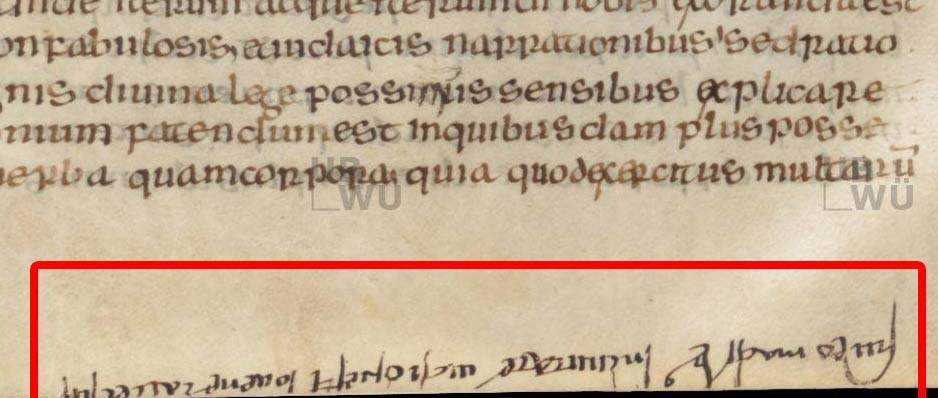A trace of the oldest verse in Italian literature has been discovered: it is an annotation, dating from between the late 9th century and the early 10th century, written by a monk in the margins of an 8th-century manuscript preserved at the University Library in Würzburg, Germany. Breaking the news is theUniversity of Udine: in fact, the discovery bears the signature of Italian language historian Vittorio Formentin, of the Department of Humanities and Cultural Heritage Studies at the University of Udine, and paleographer Antonio Ciaralli, of the University of Perugia. The discovery of the verse and its subsequent study are part of the activities of the Project of Significant National Interest (Prin) Chartae Vulgares Antiquiores, coordinated by Vittorio Formentin. An in-depth essay on the poetic text will be published in the journal Lingua e Stile at the end of the month.
According to Formentin and Ciaralli, the verse (“Fui eo, madre, in civitate, vidi onesti iovene”) constitutes the beginning of a chanson de femme, that is, a lyric form in which, speaking, is a young female voice: “a genre,” the University of Udine explains, “that certainly occupied a very important place in ancient Romance lyric poetry and has survived to this day (or yesterday) in modern popular poetry of oral tradition.” In this case, the young voice is that of a girl confessing to her mother her disturbances at the sight of a group of young people. We do not know to whom this verse is owed: the two scholars speak of a “trace” because for now the only known attestation is, precisely, the note written probably from memory by the monk who annotated the Würzburg manuscript (specifically it is a manuscript of Origen’s Homilies ). However, it is a valuable trace for reconstructing the early medieval (6th-9th centuries) prototype of Romance lyric poetry, the origins of which are controversial because there are no known surviving texts.
It was a popular poem with a love theme, which we know because we are left with many early medieval Christian sources that speak of it, though condemning it as being considered immoral. A production that is therefore supposedly vast, different from contemporary Latin poetry but also from the later poetry of the Provençal troubadours, but which is unknown because no texts survive, despite attempts to trace them.
“The discussion among philologists about the origins of Romance lyric poetry,” Formentin and Ciaralli explain, “has been very heated, but there has always been substantial agreement in recognizing the centrality, in this process, of the chanson de femme, a poetic type that many comparative-reconstructive clues have led to place, albeit hypothetically, at the beginning of Romance lyric poetry.” According to the two scholars, the identification of the Würzburg verse confirms the accuracy of this hypothesis: “In fact, metrics, lexicon and theme find literal parallels in many romance compositions of the Late Middle Ages, particularly in the Galego-Portuguese cantigas de amigo of the 13th and 14th centuries, anticipating them, however, by quite a bit.” The dating of our trace therefore demonstrates the existence in the early Middle Ages of a common pro-Romanesque lyrical reservoir of popular character.
“Most important then,” Formentin and Ciaralli conclude, “is the linguistic aspect: the use of the asigmatic plural ’honest iovene’ as a direct object shows that the verse was written in an Italoromance variety. This makes it currently the oldest poetic record of our literary tradition.”
Pictured: the annotation (in the red box) of the monk with the verse “Fui eo, madre, in civitate, vidi onesti iovene” (Würzburg Universitätbibliothek, Ms.p.th.f.27, f. 38r)
 |
| Oldest known verse in Italian literature discovered, in a manuscript in Germany |
Warning: the translation into English of the original Italian article was created using automatic tools. We undertake to review all articles, but we do not guarantee the total absence of inaccuracies in the translation due to the program. You can find the original by clicking on the ITA button. If you find any mistake,please contact us.